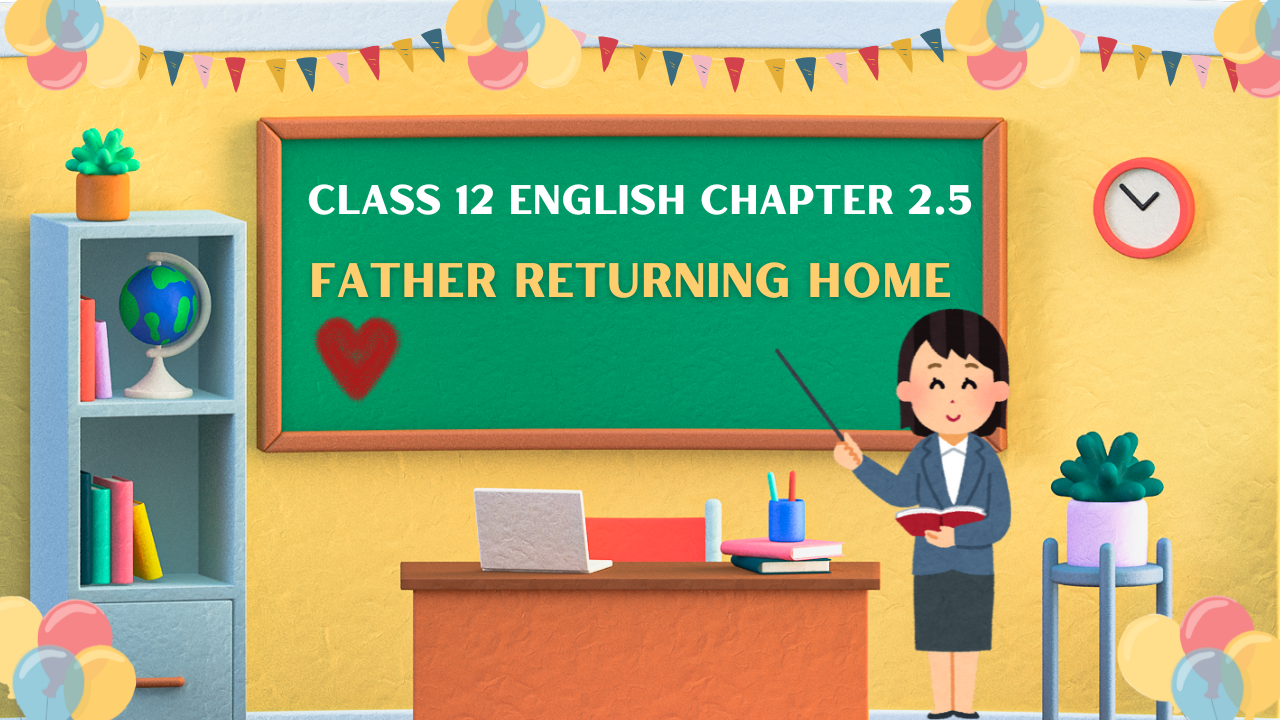Balbharti Yuvakbharati English 12th Digest Chapter 2.5 Father Returning Home Notes, Textbook Exercise Important Questions and Answers.
Class 12 English Chapter 2.5 Father Returning Home Question Answer Maharashtra Board
12th Std English Chapter 2.5 Brainstorming Question Answer
Yuvakbharati English Navneet 12th Digest PDF Free Download Maharashtra Board
Question 1.
Discuss with your partner the difficulties that you face while commuting to and from the college by public transport.
Answer:
(a) crowded buses, trains
(b) are difficult to board in peak-hours
(c) have to miss a couple of trains/buses to board safely
(d) on such days miss an important lecture
![]()
Question 2.
The similar problems are faced by the other commuters on the way to their workplace. Imagine their plight and suggest three solutions.
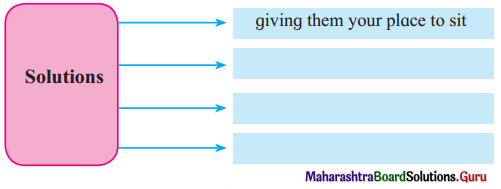
Answer:
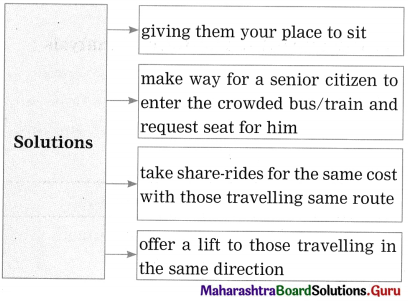
Question 3.
Complete the following table:
Answer:
| A | B |
| The way our elders take care of us | The way you can take care of elders in your family. |
| 1. Love and protect us.
2. Support, educate and guide us through childhood and youth until we are independent. 3. Provide us with pocket-money and gifts we ask for. |
1. Help them in daily chores.
2. Help with errands to the bank, stores or other requirements. 3. Ensure good health with exercise/ social- engagement/doctor- visits/ meditation. |
![]()
Question 4.
Write your duties towards the following:

Answer:
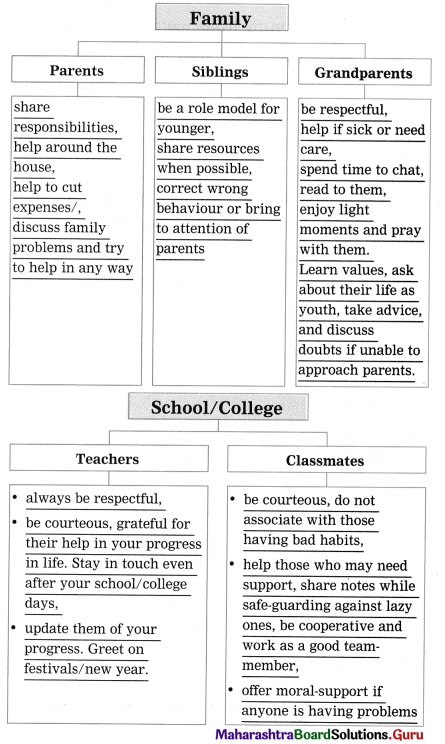
(A1)
Question (i)
Discuss with your friend the difficulties focused by the father in the poem.
![]()
Question (ii)
Discuss and write the character sketch of the father with the help of the given points.
(His pathetic condition, the treatment he receives at home, his solitude, the way he tries to overcome it)
Answer:
The father is on the late train. This shows he is hard-working. He does not spend any money on himself as his appearance is shown as shabby. He is uncaring about his appearance probably because he is lonely and heart-broken.
He is silent on the train-trip home. He does not speak to co-passengers. Perhaps the sadness in his heart prevents him from even small-talk. He has no travel-mates. He is silent through the trip, and gets off without waving goodbye to any passenger.
His family is cold, distant and uncaring. He is not greeted on arrival. He is given cold food which is not nourishing. He is left to eat the meal alone just reading his book. At the end of the work-day he reads a book, eats by himself, listens to the radio and dreams of the future all alone. Thus the father is a lonely old man, neglected by his own family in spite of working hard for them and heart-sick of his existence.
(A2)
Question (i)
Given below are the ideas conveyed through the poem. Match the pairs and draw out the hidden meaning from those expressions:
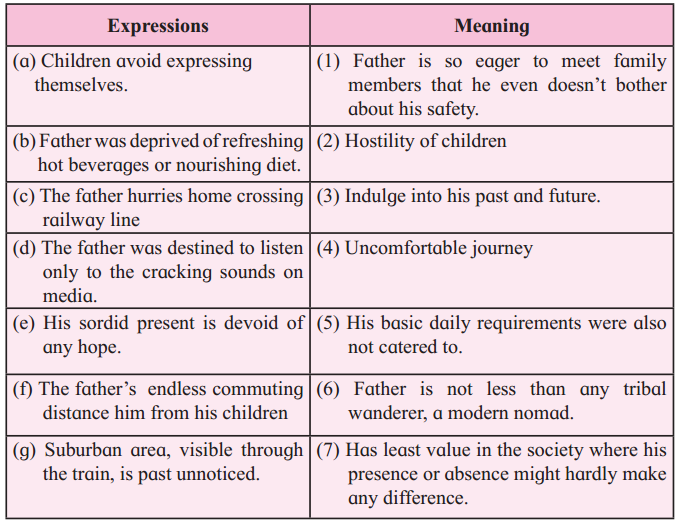

Answer:
1. The father hurries home crossing railway line – Father is so eager to meet family members that he doesn’t even bother about his safety.
2. Suburban area, visible through the train, is passed unnoticed – Because there is hardly anything enchanting/interesting in the monotonous routine journey to look out of the window
3. He is just as a small word, dropping from a sentence. – He has so little value in the society where his presence or absence might hardly make any difference
4. He doesn’t get a place in a crowded train. – Uncomfortable journey
![]()
(ii) Find the lines to prove the following facts from the extract:
Question (a)
Father is deprived of good food.
Answer:
‘Home again, I see him drinking weak tea Eating a stale chapati’
Question (b)
Children did not have a healthy relation with the father
Answer:
His sullen children have often refused to share
Jokes and secrets with him.
Question (iii)
The poet deals with the theme of man’s estrangement from a man-made world. Analyze it with the help of the extract.
Answer:
The father reaches home. He has a lonely poor meal, served without care. The stale cold food also indicates the coldness in relationships in the family. The weak tea is a metaphor for the fragile family bond. There is no bonding. Home is only a shelter for him and he is only a provider for them. The father is lonely among his own family as well. So the father is alone in the crowd of strangers and also among his own family.
Question (iv)
The father contemplates his past and peeps into his future. Give reasons.
Answer:
The father silently ponders on his past. There is no communication with his family members. He would have sat with family members together to recall happy memories and enjoy them again. Reliving the past would have been one way for the family to bond. But the father thinks of the past alone. Future plans could be also discussed with family members. A lot of discussions could have happened about money, savings, career, a wedding and so on.
Advice, suggestions are given, arguments and disagreements happen, and even anger sometimes. But the father has nothing like this happening in his presence. There is only a sullen silence. He remembers his past and thinks of possible grandchildren. No one shares his dreams. He spends the past, present and future alone and in silence.
![]()
(A3)
Question 1.
Complete the following using suitable describing words as they appear in the poem with the help of the words given in the brackets:
(weak, dim, muddy, soggy, stale)
Answer:
(a) Father’s attire – soggy
(b) Father’s tea – weak
(c) Father’s footwear – muddy
(d) Father’s food – stale
(e) Father’s eyesight – dim
(A4)
Question (i)
Identify and write the lines from the extract which expresses the following figures of speech:
Answer:
| Figures of speech | Lines |
| 1. Simile | ‘Like a word dropped from a long sentence’
The father getting off the train is compared to a word dropped unnoticed as many others words are there. |
| 2. Alliteration | 1. ‘My father travels on the late evening train’ [1] The sound ‘t’ is repeated.
2. ’Suburbs slide past his unseeing eyes’ [3] the sound ‘s’ is repeated. |
Question (ii)
I see him drinking weak tea, eating a stale chapati.
Here ‘stale chapati’ stands for stale food/ non-nourishing food or diet, where the part symbolizes the whole, i.e. food. Guess the name of the figure of speech.
Answer:
The figure of speech is ‘synecdoche’.
![]()
(A5)
Question (i)
Write a counterview on the following topic:
“Every day is a mother’s/ father’s day.”
(a) If you love them, you don’t need to wait for such days.
(b) Celebrating days is just a formality.
(c) Celebrations of the days condition your expression of emotions.
(d) It is a kind of a pretext to neglect your everyday responsibilities.
Answer:
We love and respect our parents. We must be sure to be loving and respectful in our everyday behaviour and actions. They work, laugh, sacrifice – all only for their children -US! When we behave respectfully and lovingly with elders, the cards or a special day in the year are just a formality.
Our feelings for our parents are unconditional. We don’t say ‘if they do something, only then will we do something in return, while interacting with elders in the family. We cannot be loving, caring, obedient and helpful only on a Father’s/Mother’s Day. We have to be all these towards our parents and elders EVERY DAY.
So ‘Every day is Mother’s/Father’s Day!’
Question (ii)
Write an appreciation of the poem considering the following points :
- About the poem/poet/title
- Theme
- Poetic devices, language, style
- Special features – tone and type
- Values, message
- Your opinion about the poem
Answer:
The poem ‘Father Returning Home’, by Dilip Chitre – a bilingual poet – is about a lonely old man’s coming home from a long day at work. The poet describes his silent and lonely journey home in the crowded Mumbai local train. It is a metaphor for the father’s isolated life even though he is among people.
The poet speaks of the ‘unseeing’ eyes on the scenery flashing past the train. The same thing the man sees daily when commuting has nothing new, just like his uninteresting life. The setting is dusk in monsoon. The man’s dress and appearance are also metaphorical.
His soggy clothes and mud stained raincoat symbolize his shabby appearance and also his sad life. The man carries a bag full of books. He is well-read maybe. Thus when the man gets off the train the poet compares it to a word falling from a sentence. He goes unnoticed as an unimportant word dropped from a long sentence – a simile. The ‘long sentence’ – imagery – makes us imagine the long train and the passenger is one word that is getting down.
The platform he crosses is grey, colour imagery for gloominess or dirty surroundings. The poet uses informal language and an easy style. The poet describes him ‘hurries’ along the platform and again ‘hurries’ on to his home. This repeated word shows his eagerness to reach his shelter and I get dry. The words create an imagery of a shabby, pitiable but scholarly man.
The second part of the poem is about the man in his home. The meal he eats shows the poor quality as well as the careless way it is served. He ‘ reads a book while he eats. That is a clear imagery for his loneliness at home also. The family offers no company after his long day and tiring commute.
In the toilet he is pondering on how he has been shut out of the world although he is in the crowd. He is a stranger among his family in his own home. His children don’t speak to him and won’t share any part of their life. They are not interested in his life also. He goes to sleep thinking of the past and future, listening to harsh sounds on the radio.
The message is how the elderly are used by their own children but neglected when they need care. The poem is about a man who may be misunderstood. He is lonely even in the middle of crowds. It teaches how we should not behave to j persons who are in the autumn of their life. I feel sorry for such people who have worked hard in their life but the younger relatives discard them once their use is over.
![]()
Question (iii)
Compose a short poem in about 4-6 lines on your father.
Answer:
My Father
He is unselfish, caring,
Honest and hard-working
Simple, strict and well-read
Upright, always respected
By family and every friend.
He tried to excel till the end.
Question (iv)
Write a character sketch of any one of your family member.
Answer:
My Mother
If anyone cannot believe angels walk on the earth they should come and meet my mother. My mother is the most affectionate and gentle human I have ever met. She has never spoken a harsh word to anyone as far as I recall. She is so very concerned for the comfort of every other person that she neglects herself.
She looks after her father-in-law who is in his eighties. He is a great scholar and gets many visitors. She attends cheerfully to them all apart from looking after us. My father, my sister and I help out with as much of the household chores as we can.
But the main load of running the home falls on her. She takes care of that responsibility so cheerfully as if it is very light. She is loving and jovial with our friends when my sister and I invite them home, She advises us not to overspend but always has a tasty meal when friends and relatives gather for a festival meal.
My father does not make any important decisions in my mother’s absence. She discusses everything till they arrive at the most suitable decision. Our grandfather will not eat anything which my mother has not made. After my grandmother passed, he relies on ‘Saru’ my mother, for his diet meals, medicine, his reference books, walking stick, shawl and everything to be in their place.
My mother is our world.
(A6)
Question (i)
Dilip Chitre has translated Sant Tukaram’s ‘Abhangas’ (devotional poems) for which he received Sahitya Akadeini Award. Browse the internet to collect more information about it.
![]()
Question (ii)
List various occupations related to services which can be rendered to senior citizens.
(a) To counsel patients of Alzheimers’ disease.
(b) (Students may attempt this on their own.)
(c) (Students may attempt this on their own.)
Yuvakbharati English 12th Digest Chapter 2.5 Father Returning Home Additional Important Questions and Answers
Read the extract and complete the given activities:
Global Understanding:
Question 1.
List the difficulties faced by the father in the extract.
Answer:
- The father is returning late in the day.
- He has to stand the entire trip home.
- He is in wet clothes for a long time till he can reach home.
- His sight is weak with age.
- His cheap footwear is muddy and maybe inconvenient in the monsoon.
Question 2.
Find the lines to prove the following facts from the poem.
Father does not bother to buy anything new for himself and makes do with old, worn out possessions.
Answer:
‘His bag stuffed with books is falling apart’ (line 6)
![]()
Question 3.
Choose the correct option and give reasons for it:
Refusal of the children to share jokes and secrets indicates:
(a) They are angry
(b) Generation gap
(c) Lack of concern
Answer:
All three could be reasons.
The children are angry that the father is unable to earn more, provide better life for them.
The father is old and the youngsters cannot relate to him. They are selfish and don’t care for the man who is doing his best.
The children have no care, love or respect for the father. It might not be a close-knit family. So there is no concern for the hard-working breadwinner.
Question 4.
List the difficulties faced by the father in the extract.
Answer:
- The father is not greeted on his arrival home at the end of the day; is not served any nourishing food – has weak tea and stale chapati.
- The family does not interact with him. His book is his company.
- His children are bad tempered sharing no details of their life or asking about his day.
- He must be going to work like this, also returns silently, to a silent home to his unfriendly family for whom he works.
- He is unnoticed, uncared for, unappreciated, almost like an outsider in his own home and family.
Inference/Interpretation/Analysis:
Question 1.
The poet deals with the theme of man’s estrangement from a man-made world. Analyze it with the help of the extract.
Answer:
There are two scenarios in the poem. The first part is about the father’s time spent time outside, and the second part describes his time in his home. The first line says he is travelling on the evening train. The Mumbai local trains are famously crowded. But among the crowds he does not speak to a fellow passenger. He stands silently through the commute till he gets down. He doesn’t take leave of any friend and no one waves to him. Among the crowds he is alone.
Question 2.
Given below are the ideas conveyed through the poem. Match the pairs and draw out the hidden meaning from those expressions:
Answer:
| Expressions | Meaning |
| 1. The father hurries home crossing railway line | (a) Uncomfortable journey |
| 2. Suburban area, visible through the train, is passed unnoticed. | (b) Has least value in the society where his presence or absence might hardly make any difference |
| 3. He is just as a small word, dropping from a sentence. | (c) Because there is hardly anything enchanting/ interesting in the monotonous routine journey to look out of the window |
| (4) He doesn’t get a place in a crowded train. | (d) Father is so eager to meet family members that he doesn’t even bother about his safety. |
Answer:
1. Children avoid expressing themselves – Hostility of children
2. Father was deprived of refreshing hot beverages or nourishing diet – His basic daily requirements were also not catered to.
3. The father was destined to listen only to the crackling sounds on media – The father could not even have some entertainment by himself on the radio.
4. His sordid present is devoid of any hope – He could only indulge in imagination about his past and future.
5. The father’s endless commuting distance him from his children – Father is not less than any tribal wanderer, a modern nomad.
![]()
Personal Response:
Question 1.
Write a note on ‘the hard work faced by parents for the family’.
Answer:
Our parents love us from the moment we are born. They watch us grow up and give us everything they can. They try to fulfil our wishes to the maximum extent possible. They work hard. The father works outside the home and the mother in the home. They spend their time, energy and resources on the children.
The children should realize that their parents do so much for them. We must not take their sacrifice for granted. We can never repay them. We must at least try and give them comfort and joy. It is our first duty to obey and love our parents and look after them when they grow old and unable to take care of themselves.
Question 2.
Describe the nature of the family members, from the father’s behaviour in the extract.
Answer:
The family members seems selfish and uncaring. The father drinks weak tea and eats stale food on his return. It is possible to serve fresh food, to the bread-winner returning home even if it is the most simple or poorest of food. If he has a wife then she does not seem to care much about his wellbeing.
The poet clearly states that the children have refused to share any lighter moments or conversation with their father. Probably the mother’s behaviour has made the children also treat him this way. If it is poverty they are facing then the family seems selfish in demanding he work for them but not even offering their company or kindness in return.
Poetic Devices:
Question 1.
Find out the examples of transferred epithet from the extract.
Answer:
‘Suburbs slide past his unseeing eyes. The ‘unseeing’ is transferred to eyes. The eyes are seeing but his mind is not registering any sight. So the quality of ‘not seeing’ is given to the eyes.
![]()
Poetic Creativity:
Question 1.
Compose a few lines on ‘Distance’.
Answer:
Distance
I travel for an hour to work, and an hour back.
This is the exact distance of the track
Between myself and the people whom
I go to in a place called home.
12th Std English Questions And Answers:
- Song of the Open Road Class 12 Questions And Answers
- Indian Weavers Class 12 Questions And Answers
- The Inchcape Rock Class 12 Questions And Answers
- Have you Earned Your Tomorrow Class 12 Questions And Answers
- Father Returning Home Class 12 Questions And Answers
- Money Class 12 Questions And Answers
- She Walks in Beauty Class 12 Questions And Answers
- Small Towns and Rivers Class 12 Questions And Answers
